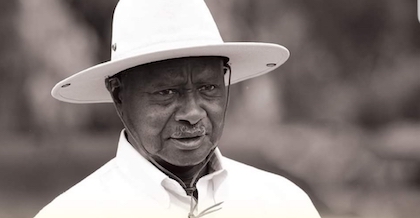Gen. Museveni, 34 years of destruction. Photo: Facebook
The Uganda government’s unofficial propagandist Andrew Mwenda recently posted the following words on his Facebook page: “Even though our country is still very poor, the numbers above show that the lives of many Ugandans have greatly improved under Museveni. The opposition should not imagine or invent a Uganda that does not exist. They should demonstrate that they know where we were in 1986, where we are today and what it has taken for us to get here. Only then can anyone with a brain believe that they have an idea of where they want to take the country, leave alone knowlege of what it takes to take it there.”
Apart from his misspelling of the word “knowledge”, there’s something terribly wrong with his argument or the lack thereof. Mwenda seems to treat the economy as an impressive aggregation of numbers which lend a fig leaf of respectability to lies. The economy is about people, not numbers.
So if people are poor, the only way numbers will apply is when we accept that the government’s days are numbered. That’s because a government’s job is to ensure that people have jobs which serve as jumping off points to a better quality of life. However it is clear to everyone with a working pulse that unemployment is rising in Uganda.
One doesn’t need the shocking unemployment figures to realize that poverty is a vehicle which has overrun the country. And has then reversed to ensure that we are ground into the dirt of our NRM-induced misery.
Still, let’s pretend that numbers are a reality beyond statistics. And that, in the words of Mwenda, “the economy of Uganda (measured by GDP) has grown at an annual rate of nearly 7% per, its (sic) per capita income at nearly 4%, both of which are among the best in history.”
If we look at growth as the quantitative increase in the volume of goods and services, we shall realize that growth increases when such goods and services are available—and not as an indicator of whether said goods and services improve the quality of life.
For example, I may open a hotel and this will immediately reflect favorably on the country’s growth figures.
However, let’s say at this hotel, I employ workers for a pittance by paying them starvation wages. Again, I use the revenue I get from this hotel to evade taxes by greasing the system with bribes and kickbacks to government officials.
Furthermore, if I am a foreigner, I repatriate profits— accruing to this hotel—abroad to ensure that Uganda gets “richer” while Ugandans get poorer. The devil in the detail of numbers is that we reap what we don’t sow and sow what we don’t reap. The cumulative effect is a whirlwind sown as our rumps are exposed by the whip-wielding mistress of reality.
“There is terror in numbers,” wrote Darrell Huff in the seminal book “How to Lie with Statistics”. This illuminating book revealed how many of us genuflect to the gods of averages, correlations, graphs, and trends. Yet these gainsay a reality we must pay close attention to if we are to improve our lot. Huff, as if appealing to deluded persons such as Mwenda, sought to break through “the daze that follows the collision of statistics with the human mind”
I appreciate this book as a wake-up call to people who use numbers as blunt instruments which hammer away any opposition to the official lies peddled in the name of truth by governments such as Uganda’s. “The secret language of statistics, so appealing in a fact-minded culture, is employed to sensationalize, inflate, confuse, and oversimplify,” warns Huff. When these statistics are used in the service of what has been called the “dismal science” (read economics), one quickly realizes that there is a conspiracy afoot.
Agreed.
Statistics, GDP and other indicators do have their place. But this place is largely academic in nature as the gap between rationality and reality is widened to a chasm. In Uganda’s case, this is mainly because president Museveni has done a brilliant job in securing his own personal position. To secure Uganda’s, he needs to support change.
For even as Mwenda is as dismissive of today’s opposition as the arrogance of power demands, Museveni’s National Resistance Movement (NRM) government has reached its lowest point. It can’t sink any lower than it has done. So the only way forward, is up—and the way up will only be achieved by change, even as Mwenda says, “NRM has nourished Uganda, not sucked it”; change is an idea whose time has arrived.
The only way we can prove this is by accepting the inevitable: a post-Museveni Uganda. The alternative is chaos. We surely appreciate Mwenda’s figures, but man cannot live on “indicators” alone. Besides, they’re usually more Potemkin than real.







